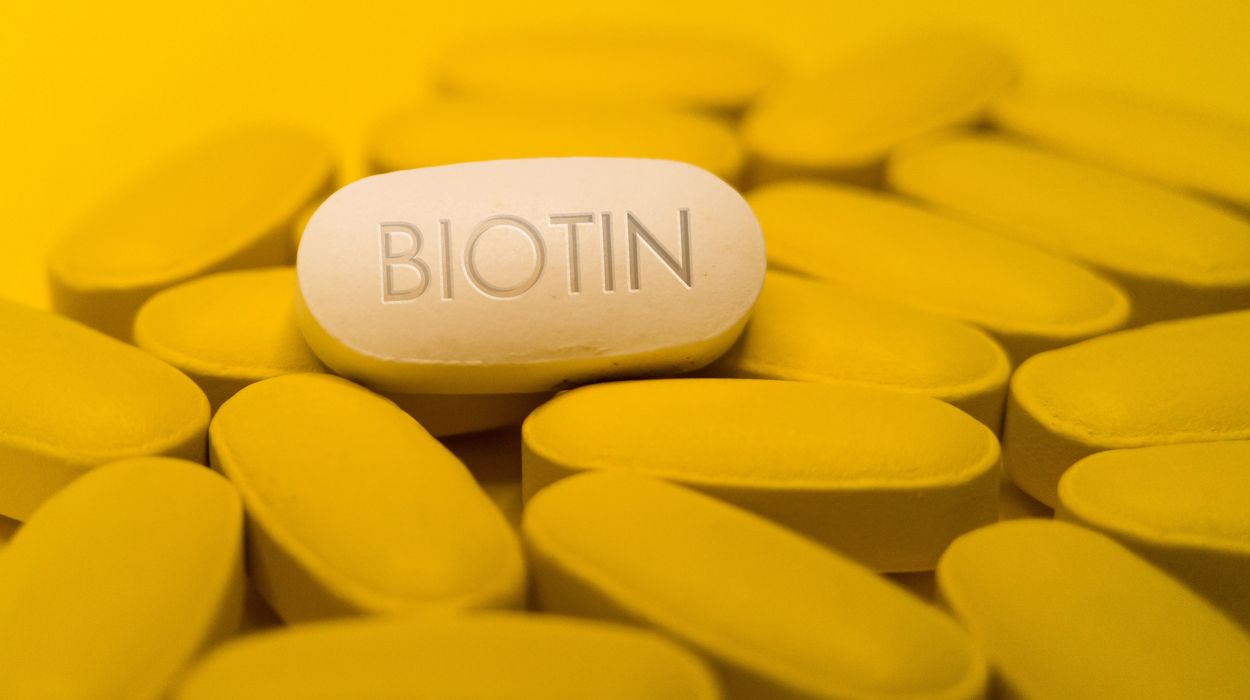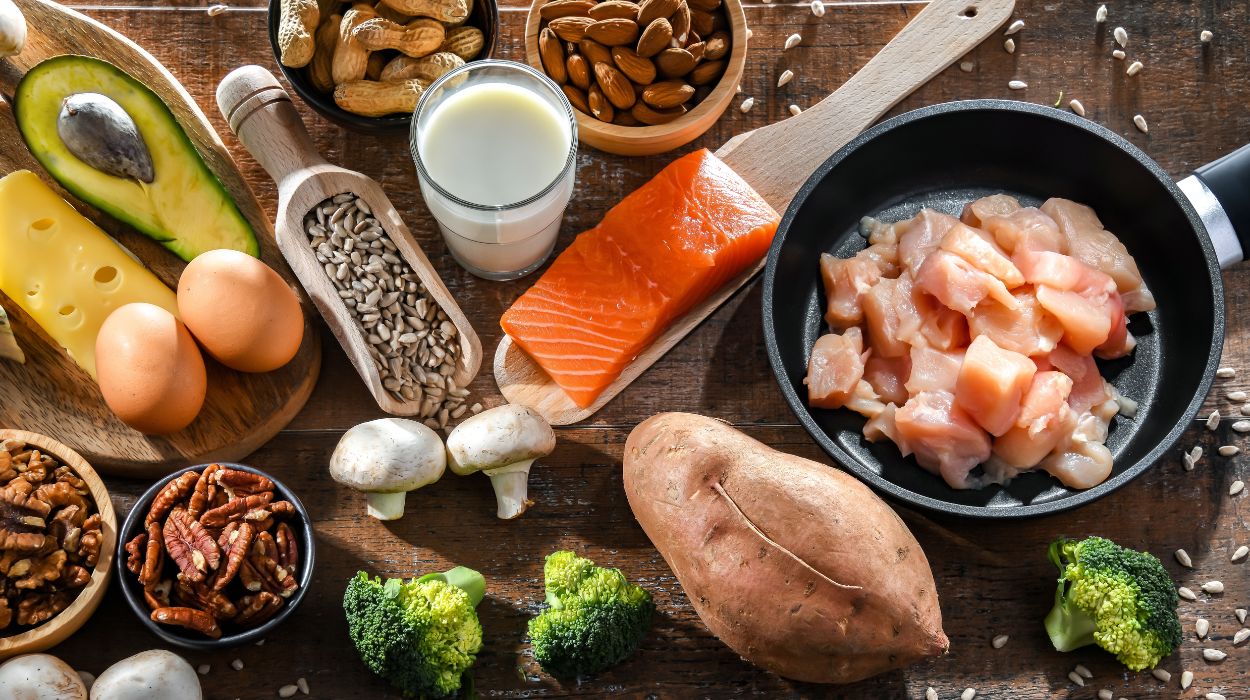 Expert's opinion
Expert's opinion
Expert's opinion
The article is a subjective view on this topic written by writers specializing in medical writing.
It may reflect on a personal journey surrounding struggles with an illness or medical condition, involve product comparisons, diet considerations, or other health-related opinions.
Although the view is entirely that of the writer, it is based on academic experiences and scientific research they have conducted; it is fact-checked by a team of degreed medical experts, and validated by sources attached to the article.
The numbers in parenthesis (1,2,3) will take you to clickable links to related scientific papers.
Biotin For Hair Growth: Benefits, Dosage & Side Effects In 2024

Tired of covering up your hair, or lack thereof, with a hat? Pharmacy aisles are gleaming with various hair growth products such as biotic supplements. But what does the science say, and is it worth spending your hard-earned dollars on biotin? Read on to find out if biotin for hair growth works, how much you’ll need, and the risks that come with it.
If you’re seeing more and more bald spots and noticing a lackluster dullness to your hair, you’re not alone. By age 35, almost 70%[1] of men have some degree of hair loss. By age 50, about 85% have significant thinning.
Of course, it’s not just men. Almost 40%[1] of women over 70 also experience hair loss and about 32% of women over 20. And since society associates hair with beauty and health, losing it can come with depression, too. Companies recognize this vulnerable market and have earned over seven billion[1] in sales in 2015 alone.
Biotin For Hair: Does It Help?
Unfortunately, there isn’t enough research supporting the claim that biotin[2] helps hair regrowth. There is some evidence, however, pointing toward its ability to prevent hair loss and help hair grow for people deficient in biotin or with certain medical conditions.
It’s quite rare for healthy individuals to have a biotin deficiency and biotin supplement.
Biotin For Hair Growth: How Much Should I Take?
In general, how much biotin per day for adults is 30 micrograms,[2] or mcg, and 35 mcg for breastfeeding women. Fortunately, your daily needs can be easily met through food. For example, the average amount that people eat in the typical Western diet is about 35 to 70 mcg per day.
This is why in most cases, taking biotin supplements to support hair growth isn’t necessary, especially supplements above the recommended 30 mcg. You may notice many supplements offering thousands of mcg per day but just remember – it’s a water-soluble vitamin. That means any extra will just be excreted through your urine and not absorbed in the body.
Ultimately, you can maintain healthy hair through a healthy diet without spending extra on vitamins that will probably just be peed out.
Deficiency Symptoms
A biotin deficiency is extremely unlikely unless you have a rare biotinidase disorder. It’s an autosomal recessive disorder that prevents the body from releasing biotin to use for its necessary functions.
This creates a deficiency, no matter how healthy you eat. Fortunately, it can be treated with oral biotin supplements from birth to prevent deficiency symptoms.
Also, those with chronic exposure to alcohol or pregnant women and breastfeeding are at a higher risk of developing a biotin deficiency. Besides those conditions, biotin for hair loss is likely to be ineffective.
Therefore how much biotin promote hair growth you need depends upon any medical condition you might have. Otherwise, you probably don’t need a supplement.
These are some signs[3] that you might be deficient in biotin:
- Fatigue.
- Hair loss.
- Dry eyes.
- Insomnia.
- Depression.
- Dry, scaly skin.
- Loss of appetite.
- Neurological disorders.
- Cheilitis — cracks in the corners of the mouth.
- Glossitis — bright pink, swollen, and painful tongue.
Again, it’s very uncommon to be deficient unless you have a rare disorder called biotinidase or drink heavily. Those with inflammatory bowel disease or an imbalance of gut bacteria may also be at a higher risk since gut bacteria are involved in biotin production.
Also, you might have some of these symptoms, but they could very well be part of malnutrition or another health condition, including stress. If you have any of the symptoms listed above, it’s best to see your doctor for a full medical checkup with a blood work analysis.
What Is Biotin?

Biotin, or vitamin B7, is an essential micronutrient that works with hundreds of bodily functions. Your body doesn’t make it, so you have to consume it from food to meet your daily needs.
These are some of the areas in which biotin works:
- Regulates cell signals.
- Promotes embryonic growth.
- Turns food into energy for your cells.
- Regulates gene activity and cell growth.
- Involved in inflammation and immune responses.
- Produces keratin — the protein that makes up skin, nails, and hair.
It’s also a water-soluble vitamin, so your body doesn’t store it in its tissues. The bacteria in your intestines can make biotin, too, but most people get enough from food.
Benefits Of Biotin
Biotin is also called vitamin H because of its supposed effects on hair health. Since biotin is involved in the production of keratin, a protein that makes up the structure of the hair, it’s supposed that extra biotin might help stimulate more keratin.
Biotin can also help increase blood flow to the scalp, which might help stimulate hair growth. It’s an essential micronutrient and benefits countless areas of your health. Fortunately, if you’re eating a standard Western diet, you’re likely already getting enough and reaping its rewards.
Research[4] on the benefits of biotin supplementation is unfortunately quite weak, with most studies focusing solely on those who have deficiencies due to medical disorders.
So, if you’re wondering about biotin supplements may help stimulate[5] hair regrowth. A double-blind study[6] also showed that women with self-perceived thinning hair benefited from extra-strength marine protein supplements with biotin for hair growth.
An important note is that researchers observed that alopecia and temporary hair loss can resolve spontaneously, so we can’t say for certain that biotin caused the regrowth.
Besides benefiting those suffering from clinical conditions, biotin may also help with certain conditions, such as:
- Diabetes.[7]
- Multiple sclerosis.
- Brittle fingernails[8] or toenails.
More research needs to be done to confirm that biotin can help improve these conditions, along with helping to recreate healthy hair.
Biotin Side Effects
There aren’t any established upper limits[9] for biotin since there isn’t any evidence that it’s toxic at high intakes. There don’t seem to be any adverse effects from 10 to 50 milligrams per day or even 200 mg for those with biotinidase deficiency.
However, too much biotin can cause clinically significant false laboratory test results for other issues, such as thyroid hormone levels. Taking too much might even lead to some acne or digestive issues, but it depends on how much extra you take and your levels, to begin with.
Finally, biotin might also interact with other medications or medical conditions. You should always speak to your doctor before beginning any supplements, especially if you have any other suspected health issues.
Foods That Have Biotin Hair Growth

These are some of the foods highest[9] in biotin, including their micrograms per serving.
- Egg, whole, cooked — 10.0 mcg
- Salmon, pink, canned in water, 3 ounces — 5.0 mcg
- Sunflower seeds, roasted, ¼ cup — 2.6 mcg
- Sweet potatoes, cooked, ½ cup — 2.4 mcg
- Almonds, roasted, ¼ cup — 1.5 mcg
- Tuna, canned in water, 3 ounces — 0.6 mcg
- Spinach, boiled, ½ cup — 0.5 mcg
- Broccoli, fresh, ½ cup — 0.4 mcg
- Cheddar cheese, mild, 1 ounce — 0.4 mcg
- Plain yogurt, 1 cup — 0.2 mcg
- Oatmeal, 1 cup — 0.2 mcg
- Banana, ½ cup — 0.2 mcg
While it might seem like many foods don’t have too much, eating a healthy whole foods diet can quickly add up to meet your daily value. Since it’s present in many fruits, nuts, legumes, and vegetables, even vegans don’t have to worry about a biotin deficiency.
Your Daily Meal Plan Example
Here’s a typical day with whole-food meals that easily meet your daily biotin needs.
Breakfast: Smoked Salmon With Poached Eggs On Toast With Spinach.
- 2 poached eggs— 20.0 mcg
- Smoked salmon, 3 ounces — 5.0 mcg
- Spinach, boiled, ½ cup — 0.5 mcg
Total: 25.5 mcg — 84% of your daily needs.
Lunch: Tuna Melt Sandwich.
- Tuna, canned in water, 3 ounces — 0.6 mcg
- Cheddar cheese, mild, 1 ounce — 0.4 mcg
- Whole wheat bread, 2 slices
Total: 1 mcg — 3% of your daily needs.
Dinner: Roasted Fish, Potatoes, And Vegetables.
- Baked salmon, 3 ounces — 5.0 mcg
- Yogurt lemon and dill dressing, ½ cup — 0.1 mcg
- Roasted sweet potatoes, ½ cup — 2.4 mcg
- Baked broccoli, ½ cup, with 1 ounce melted cheddar cheese, sprinkled with ¼ cup sunflower seeds — 3.2 grams mcg
Total: 10.7 mcg – 36% of your daily needs.
Snack Or Dessert: Yogurt With Bananas And Chopped Almonds.
- Yogurt, 1 cup — 0.2 mcg
- Banana, ½ cup — 0.2 mcg
- Almonds, roasted, ¼ cup — 1.5 mcg
- Oats or granola, ½ cup — 0.2 mcg
Total: 2 mcg — 7% of your daily needs.
You could also swap the yogurt with oatmeal for another breakfast, snack, or dessert.
Daily Total: 39.2 mcg — 131% Of Your Daily Needs.
In general, getting enough biotin isn’t something to worry about. If you focus on adding more whole foods like fruits, vegetables, and nuts to your day, you should be fine.
The Bottom Line
Biotin is a popular supplement available in various dosages with claims of stronger nails and thicker, luscious locks. But is biotin good for hair growth, and is this proven?
There isn’t enough research to prove that adding extra biotin can aid hair growth. There is some evidence it can help people with medical conditions that result in biotin deficiencies, but apart from that, there aren’t many strong scientific studies to prove the claim.
It’s also one of the vitamins you’re least likely to have a deficiency in, making biotin supplements unnecessary in most cases. Even the standard American diet still provides plenty of biotin for healthy individuals.
If you’d like to increase how much biotin you’re getting, look to whole food sources. Try to add extra servings of vegetables like spinach or broccoli to your dinners, and grab some almonds and bananas if you’re craving a snack.
In the end, biotin is one vitamin you don’t need to worry much about in most cases — you’re likely already getting enough. Any biotin for hair loss dose probably won’t make a big difference to your hair health. If you have concerns about your hair health or hair loss, speak to your doctor about possible causes and solutions.
+ 12 sources
Health Canal avoids using tertiary references. We have strict sourcing guidelines and rely on peer-reviewed studies, academic researches from medical associations and institutions. To ensure the accuracy of articles in Health Canal, you can read more about the editorial process here
- Lockwood, S.J. and Saavedra, A.P. (2018). Cutaneous Reactions to Drugs. Drug Allergy Testing, [online] pp.53–72. doi:https://doi.org/10.1016/b978-0-323-48551-7.00006-7.
- Nih.gov. (2020). Office of Dietary Supplements – Biotin. [online] Available at: https://ods.od.nih.gov/factsheets/Biotin-HealthProfessional/
- Saleem, F. and Soos, M.P. (2022). Biotin Deficiency. [online] Nih.gov. Available at: https://www.ncbi.nlm.nih.gov/books/NBK547751/
- Almohanna, H.M., Ahmed, A.A., Tsatalis, J.P. and Tosti, A. (2018). The Role of Vitamins and Minerals in Hair Loss: A Review. Dermatology and Therapy, [online] 9(1), pp.51–70. doi:https://doi.org/10.1007/s13555-018-0278-6.
- Patel, D.P., Swink, S.M. and Castelo-Soccio, L. (2017). A Review of the Use of Biotin for Hair Loss. Skin Appendage Disorders, [online] 3(3), pp.166–169. doi:https://doi.org/10.1159/000462981.
- Ablon, G. (2015). A 3-Month, Randomized, Double-Blind, Placebo-Controlled Study Evaluating the Ability of an Extra-Strength Marine Protein Supplement to Promote Hair Growth and Decrease Shedding in Women with Self-Perceived Thinning Hair. Dermatology Research and Practice, [online] 2015, pp.1–8. doi:https://doi.org/10.1155/2015/841570.
- Zhang, Y., Ding, Y., Fan, Y., Xu, Y., Lu, Y., Zhai, L. and Wang, L. (2022). Influence of biotin intervention on glycemic control and lipid profile in patients with type 2 diabetes mellitus: A systematic review and meta-analysis. Frontiers in Nutrition, [online] 9. doi:https://doi.org/10.3389/fnut.2022.1046800.
- Lipner, S. and Scher, R. (2017). Biotin for the Treatment of Nail Disease: What is the Evidence? [online] ResearchGate. Available at: https://www.researchgate.net/publication/320550262_Biotin_for_the_Treatment_of_Nail_Disease_What_is_the_Evidence
- Nih.gov. (2020). Office of Dietary Supplements – Biotin. [online] Available at: https://ods.od.nih.gov/factsheets/Biotin-HealthProfessional/#h8



